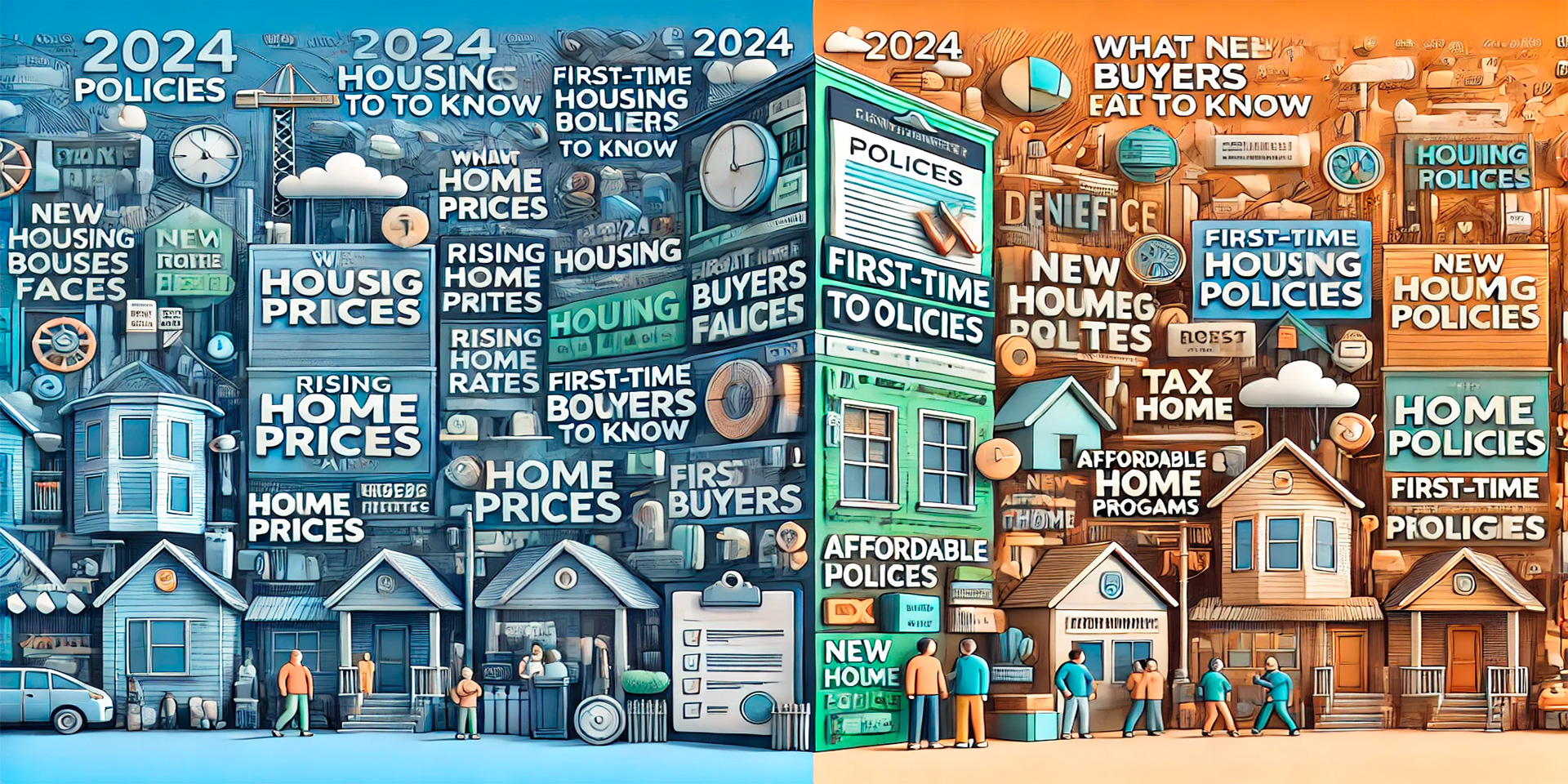For first-time homebuyers, navigating the housing market can be challenging, especially as new policies and regulations continue to shape the landscape. In 2024, governments at various levels are implementing housing policies aimed at addressing affordability, supply shortages, and rising interest rates. These policy changes can either help or hinder first-time buyers depending on their financial situation, location, and long-term goals. In this article, we’ll explore how new housing policies are affecting first-time buyers and what these changes mean for those looking to enter the market this year.
Policies Targeting Affordability
One of the primary goals of new housing policies in 2024 is to improve affordability, especially for first-time buyers who often struggle to compete in a market where home prices continue to rise. Many governments are introducing measures designed to reduce the financial burden of homeownership, such as tax incentives, subsidies, and down payment assistance programs.
Down Payment Assistance Programs
For first-time buyers, coming up with a large down payment is often the biggest hurdle. In response, many local and national governments are offering down payment assistance programs aimed at helping buyers secure the funds needed to purchase their first home. These programs typically offer grants, low-interest loans, or forgivable loans to cover part of the down payment, making it easier for buyers to afford the upfront costs of homeownership.
These initiatives are particularly beneficial in high-cost markets where saving for a down payment can take years. By reducing the size of the down payment, these policies help first-time buyers enter the market sooner, giving them a foothold in areas where home prices are rising rapidly.
Tax Incentives for First-Time Buyers
In addition to down payment assistance, some governments are offering tax incentives designed to make homeownership more accessible for first-time buyers. These incentives can take the form of tax credits or deductions, which reduce the overall tax burden for buyers and make it easier for them to manage the ongoing costs of homeownership.
For example, some jurisdictions offer first-time buyer tax credits that provide a financial boost when purchasing a home, while others allow deductions on mortgage interest payments or property taxes. These policies can make a significant difference in affordability, especially for buyers on a tight budget.

Policies Focused on Increasing Housing Supply
Another major focus of new housing policies in 2024 is addressing the shortage of affordable housing, particularly in urban areas where demand far outpaces supply. To help balance the market, governments are implementing policies aimed at increasing housing inventory through development incentives and zoning reforms.
Incentives for Developers
To encourage the construction of new homes, especially affordable housing, many governments are offering incentives to developers. These incentives can include tax breaks, fast-tracked permits, or reduced regulatory hurdles for building new residential properties. By making it easier and more cost-effective for developers to build, policymakers hope to increase the supply of homes and alleviate the pressure on prices.
For first-time buyers, an increase in housing supply can lead to more options in the market and potentially slower price growth. However, these policies take time to impact the market, and in the short term, buyers in high-demand areas may still face challenges finding affordable properties.
Zoning Reforms
Zoning laws, which dictate how land can be used, play a significant role in shaping housing availability. In 2024, some regions are enacting zoning reforms that allow for more flexible use of land, particularly in urban areas where strict zoning has limited the construction of affordable housing.
By easing zoning restrictions and allowing for higher-density housing, such as apartment buildings or multi-family homes, these policies aim to create more housing opportunities in areas where space is limited. For first-time buyers, these changes could lead to more affordable options, particularly in city centers where single-family homes are often out of reach.
Interest Rate Policies and Mortgage Availability
Interest rates and mortgage policies are key factors in determining the affordability of homeownership. In 2024, interest rate policies continue to evolve, and first-time buyers are feeling the effects of these changes as they navigate financing options.
Rising Interest Rates and Mortgage Costs
Higher interest rates can make borrowing more expensive, which directly impacts mortgage affordability for first-time buyers. In recent years, many central banks have raised interest rates to combat inflation, leading to higher mortgage rates. This can make it more challenging for first-time buyers to qualify for loans or afford the monthly payments on a home.
To counteract this, some governments are implementing policies aimed at helping first-time buyers secure affordable mortgages. These policies may include rate buy-down programs, which allow buyers to lock in lower interest rates for a certain period, or subsidies that reduce the overall cost of the loan.
Expanded Mortgage Programs for First-Time Buyers
Some mortgage lenders and government programs are expanding options specifically for first-time buyers, offering more flexible lending criteria or reduced down payment requirements. These programs often cater to buyers with limited credit histories or lower incomes, making it easier to qualify for a mortgage.
For example, programs like government-backed FHA loans in the U.S. allow for lower down payments and more lenient credit requirements, giving first-time buyers more access to financing. Additionally, some lenders offer special mortgage products for first-time buyers that come with lower interest rates or longer repayment terms, making homeownership more attainable.

Rental Market Policies and Their Impact on First-Time Buyers
New housing policies aimed at the rental market can also affect first-time buyers, particularly those who are considering whether to continue renting or make the jump to homeownership.
Rent Control and Affordability Pressures
In some areas, rent control policies are being introduced or expanded to protect tenants from steep rent increases. While these policies are designed to help renters, they can also have unintended consequences for first-time buyers. Rent control can make renting more affordable in the short term, which may delay some potential buyers from entering the housing market. If rent remains stable and affordable, first-time buyers may choose to continue renting rather than taking on the financial commitment of homeownership.
However, rent control policies can also reduce the incentive for developers to build new rental properties, potentially leading to a shortage of available units. This could increase competition for rental housing, pushing more renters toward homeownership as a long-term solution to rising costs.
First-Time Buyer Assistance Programs and the Rental Market
As governments introduce more assistance programs for first-time buyers, these initiatives may incentivize renters to make the leap into homeownership. Programs that offer down payment assistance, lower mortgage rates, or tax incentives can make owning a home more appealing, particularly in markets where rent is rising faster than home prices.
For renters considering whether to buy, these programs can provide the financial boost needed to transition from renting to owning, making it easier to afford a home even in competitive markets.
Conclusion: Navigating the Impact of New Housing Policies
New housing policies in 2024 are having a significant impact on first-time buyers, shaping everything from affordability and mortgage availability to housing supply and rental market dynamics. For first-time buyers, understanding these policy changes is essential for making informed decisions about when and where to buy. While some policies are designed to help first-time buyers by reducing costs or increasing housing availability, others may create new challenges, such as rising interest rates or increased competition for affordable homes.
By staying informed about new policies and taking advantage of assistance programs, first-time buyers can better navigate the complexities of today’s housing market and make the leap into homeownership with confidence.






